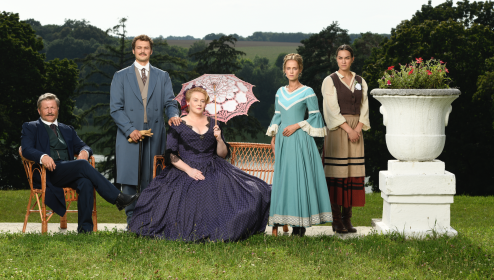
Fakt.pl paints an impressive picture: “Abandoned villages, empty children’s playgrounds… Before you panic and think this is the end of the world, check the time. If it is after 8:35 PM, this means that people are at home watching Love in Chains. Maybe we have exaggerated a little with this description but a fact is a fact: the Ukrainian series has imprisoned us. The Poles give up their duties and old hobbies to follow Kateryna’s destiny.”
.png)
Due to the series popularity, TVP1 invited actors Kateryna Kovalchuk, Mykhaylo Havrylov and Oleksiy Yarovenko to Poland. Last week the artists were among the most important guests of the channel’s autumn program presentation, and afterward participated in lots of interviews and photoshoots. Everywhere the fans thanked the actors playing roles in their favorite film and stood in lines to get autographs.
Moreover, Pudelek (a Polish website) informed that Kateryna Kovalchuk might come back to Poland again as she is invited to participate in “Dance, dance, dance” show on TVP. However, there is no official information about that yet.
Still, repeated screenings of both seasons of the project have been announced; they will start on September 3 and last until the following summer. Every Tuesday at 8:55 PM the viewers will be watching one episode of the drama.
Love in Chains fans are looking forward to the last episodes, require Polish translations of books based on the script and also hope for the sequel. This is how they explain their love for the project:
“I am watching the series, it is beautifully made. Not like in American cinema where computer creates an image and the actor cannot act. Here the actors really act in the scenes. Bravo,” says Bogumila Kopek.
This is how they reply to the proposals to show a new Brazilian TV show, Escrava mãe, on Polish television:
“I propose more series from Russia, Ukraine, Belarus… Let us get to know our Eastern neighbors better and stop looking at them through the prism of war and Putin. Latin America is great and colorful but it seems we know it better than people who live right next to us,” Not so scary East writes.
Jacek Kurski, head at TVP state company, also shared in an interview for dziennik.pl his opinion about the series: “For me, it is a captivating film but first of all a phenomenon demonstrating aspirations of our viewers. Our audience has been fed by “Turks”, “Brazilians” or “Venezuelans” for years, series from other cultural fields. For the first time in many years, even decades, a TV show from our geographic and cultural environment has appeared. In my opinion, this was the key to success.
“Showing six episodes per week was also my idea. I understood it should be like that when the results of the first episode were 1 million viewers, the second, 1 million 150 thousand, and the third, 1 million 560 thousand. I saw that we’d make a huge mistake if we only show 24 episodes of season one and upload the second one to a VOD portal. And when will the second season make it to TV broadcasts? In a year? When everybody forgets about it? I counted we’d fit in perfectly if we show it six times a week. This is how this series became a way to entertain during the vacation season.”
.png)
Comparisons of Love in Chains and Escrava Isaura have reached their peak, and TVP invited Maksym Lytvynov, one of the directors, and actress Anna Sahaydachna to its analytical program “Alarm!”. This is how Lytvynov commented on the similarity between the projects:
“Escrava Isaura was popular in our country and we thought about a remake. Therefore, we decided to buy the rights to the series. However, in Brazil we haven’t managed to find out who they belong to. So then we decided we’d write our own script. As a result, we produced a film drama which can be compared with British ones. In no case, it is just as light and sweet as the Brazilian film. Not at all.”
However, Polish viewers don’t care too much about it and look at the project through fresh eyes:
“Every time there is more of Tolstoy’s Anna Karenina and every timeless of Escrava Isaura,” Paul writes.
Irma answers, “The Brazilian version was good but times change, and Ukrainian version lacks nothing, I believe each version has something in it the script, actors, beautiful environment, all that is super”.
FILM.UA Group
22, Mykoly Zakrevskoho str., Kyiv, 02232, Ukraine
tеl.: 0 800 308 028, +380 44 501-39-71 fax: +380 44 546-68-97 e-mail: info@film.ua
Developed by Argentum IT Lab
